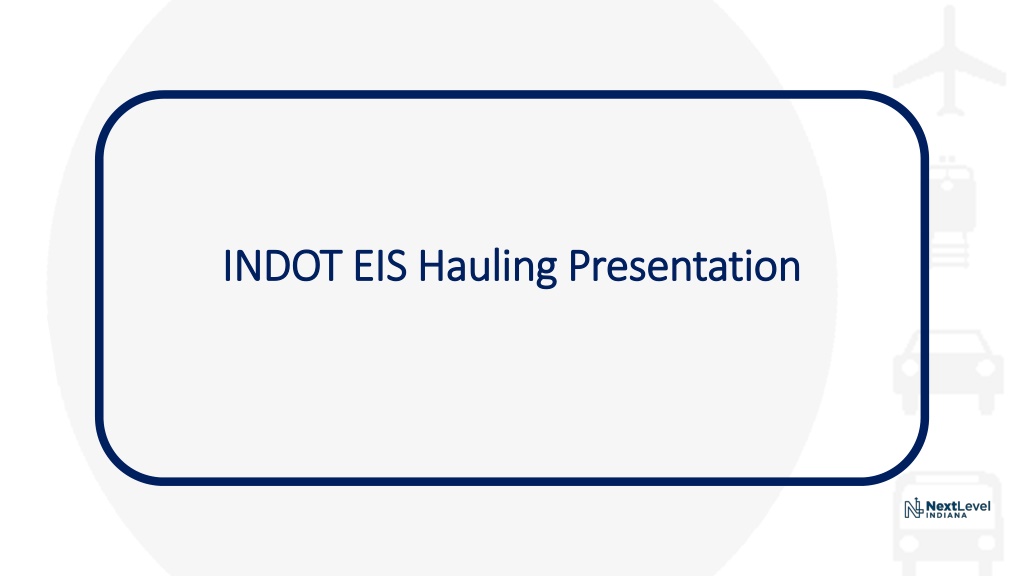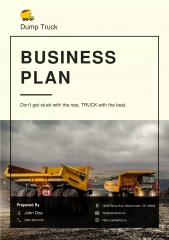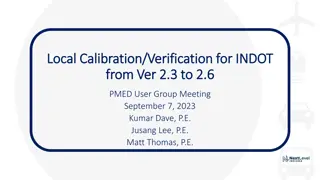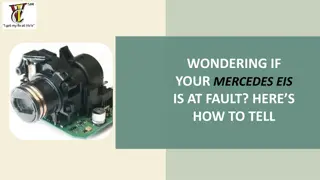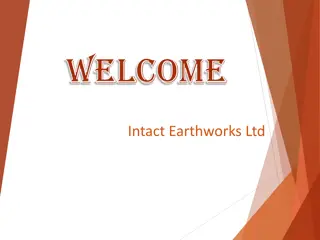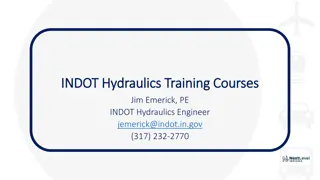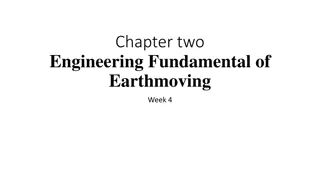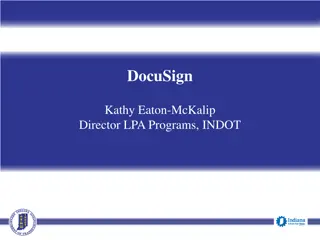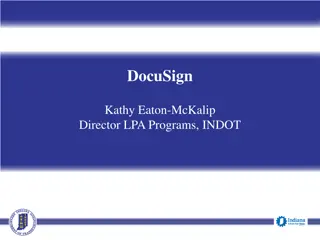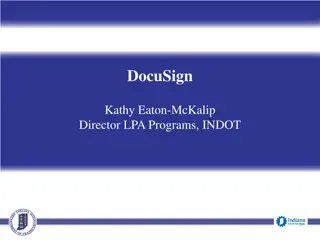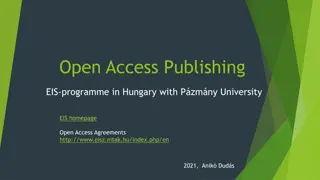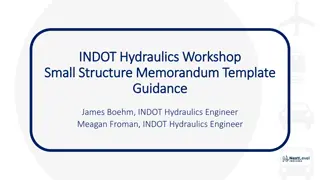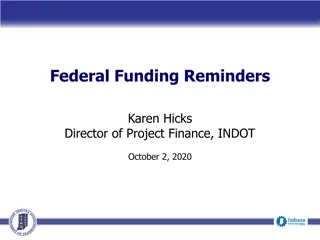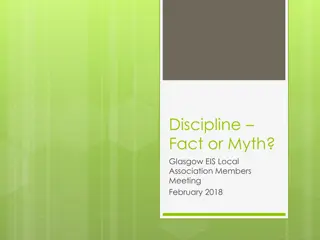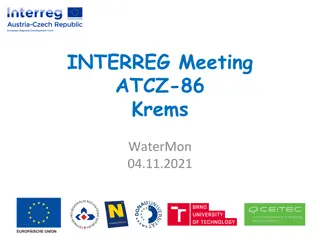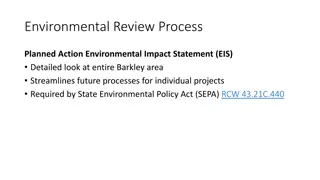INDOT EIS Hauling Best Practices Presentation
This presentation covers current trucking practices in the field, focusing on lease agreements, DBE and non-DBE trucking, commercially useful function monitoring, and more. It clarifies requirements for prime contractors and subcontractors, emphasizing the importance of proper documentation and adherence to INDOT guidelines for hauling operations.
Download Presentation

Please find below an Image/Link to download the presentation.
The content on the website is provided AS IS for your information and personal use only. It may not be sold, licensed, or shared on other websites without obtaining consent from the author.If you encounter any issues during the download, it is possible that the publisher has removed the file from their server.
You are allowed to download the files provided on this website for personal or commercial use, subject to the condition that they are used lawfully. All files are the property of their respective owners.
The content on the website is provided AS IS for your information and personal use only. It may not be sold, licensed, or shared on other websites without obtaining consent from the author.
E N D
Presentation Transcript
INDOT EIS Hauling Presentation INDOT EIS Hauling Presentation
Purpose To discuss current in-the-field practices regarding trucking (DBE and non-DBE) and provide clarification over requirements for prime contractors and subcontractors. Specific items covered: Lease agreements Counting of Credit Commercially Useful Function (CUF) monitoring Changes in Utilization Prompt Payment Certified Payroll Contact information if you have questions or issues
Lease Agreements Who do we collect them from? Everyone, with one exception. (Primary hauler is a non Everyone, with one exception. (Primary hauler is a non- -DBE) DBE) Remember- haulers are excluded from prequalification so no dollar threshold issues exist. Who at INDOT is collecting leases currently? The District EEO officer and/or the Construction Project Manager (Note The District EEO officer and/or the Construction Project Manager (Note this could be an INDOT employee or a Consultant.) Consultant.) this could be an INDOT employee or a When should INDOT collect them? Prior to anyone coming onto the job site. Easiest to collect at the pre Prior to anyone coming onto the job site. Easiest to collect at the pre- -construction conference if possible. construction conference if possible. Will INDOT accept an annual lease agreement for hauling? Yes Yes- - include the job number and dollar amount at the top of the copy of the annual agreement. include the job number and dollar amount at the top of the copy of the annual agreement.
Lease Agreements (Cont.) Does INDOT provide an approved form for leases? No. No. Do leases need to be physically carried in each truck? No, but they are subject to request at anytime. No, but they are subject to request at anytime. What is required of the main hauler? Does it matter if they are a DBE or not? See slide 14 See slide 14 Hauling at a Glance. Hauling at a Glance. What is required of the supplemental fleet? Does it matter if they are a DBE or not? See slide 14 See slide 14 Hauling at a Glance. Hauling at a Glance.
Commercially Useful Function Monitoring DBE participation on a contract will only be counted toward a contract goal if the DBE is performing a commercially useful function. A DBE performs a commercially useful function when it is responsible for execution of the work of the contract and is carrying out its responsibilities by actually performing, managing, and supervising the work. To ensure that a DBE is performing a commercially useful function on a contract, INDOT evaluates the DBEs performance on the project. This typically entails watching the actual work taking place, interviewing employees, verifying equipment, inspecting delivery tickets and lease agreements, etc. Delivery tickets MUST include trucking firm name on EACH ticket for material delivered by a DBE If for whatever reason it is determined that a DBE is not performing a commercially useful function, then the amount of DBE credit a prime contractor is awarded may be reduced accordingly.
Changes in DBE Utilization Prime contractor requirements: Contractor may not terminate a DBE or reduce its commitment to a DBE listed on the Affirmative Action Certification without INDOT s prior written consent. INDOT will only provide written consent if there is good cause to do so. Contractor must give written notice to the affected DBE (with copy to INDOT) of its intent to equest a termination or reduction and the reason(s) for the request. Contractor must inform the affected DBE that it has five (5) days to respond to its written notice with or without objection. If consent is provided, contractor must make good faith efforts at finding another DBE to perform at least the same amount of work under the contract as the DBE that was terminated or had its commitment reduced, to the extent needed to meet the contract goal. If consent is not provided, the contractor will not be entitled to any payment for work or material unless it is performed or supplied by the listed DBE. Failure by the prime contractor to meet these requirements is a material breach of contract and may result in administrative sanctions.
Changes in DBE Utilization (Cont.) DBE fails or refuses to execute a written contract Potential Good Cause Considerations As Defined in 49 CFR 26.53 DBE fails or refuses to perform the work of its subcontract DBE fails or refuses to meet the prime contractor s reasonable nondiscriminatory bond requirements DBE voluntarily withdraws from project with written notice DBE ineligible to receive DBE credit for type of work required DBE owner becomes disabled or deceased with result of unfinished DBE commitment DBE is determined by INDOT to be irresponsible Other documented good cause Link to the Change in Utilization Form: https://www.in.gov/indot/doing- business-with-indot/files/Change-In-DBE-Utilization-Form.pdf.
Prompt Payment INDOT EIS staff conducts random audits to ensure compliance. Primes are not required to pay when invoices are generated but some may due to awareness of challenges small businesses face. If you have questions about timing of payment reach out to the prime first, and if the matter is not resolved, email Promptpayment@indot.IN.gov. Be sure to include as much specific information as possible, such as the contract number, name of the prime, invoice(s) in question, etc.
Certified Payrolls for Haulers Is the haul taking place on the site of work ? Site of work is defined under 29 CFR 5.2 (j) (2) as: The term site of the work is defined as follows: (1) The site of the work is the physical place or places where the building or work called for in the contract will remain; and any other site where a significant portion of the building or work is constructed, provided that such site is established specifically for the performance of the contract or project; (2) Except as provided in paragraph (l)(3) of this section, job headquarters, tool yards, batch plants, borrow pits, etc., are part of the site of the work, provided they are dedicated exclusively, or nearly so, to performance of the contract or project, and provided they are adjacent or virtually adjacent to the site of the work as defined in paragraph (l)(1) of this section; (3) Not included in the site of the work are permanent home offices, branch plant establishments, fabrication plants, tool yards, etc., of a contractor or subcontractor whose location and continuance in operation are determined wholly without regard to a particular Federal or federally assisted contract or project. In addition, fabrication plants, batch plants, borrow pits, job headquarters, tool yards, etc., of a commercial or material supplier, which are established by a supplier of materials for the project before opening of bids and not on the site of the work as stated in paragraph (l)(1) of this section, are not included in the site of the work. Such permanent, previously established facilities are not part of the site of the work, even where the operations for a period of time may be dedicated exclusively, or nearly so, to the performance of a contract.
Certified Payrolls (Contd) If hauling (materials or supplies) does NOT take place on the site of work then NO certified payrolls are required from ANY hauler.
Additional Information Spec Book 108.12 any documents (including leases) can be requested at any time; Haulers need to be e-verified; No haulers need to identify an EEO on the bulletin board. Trucking Reports are no longer required. The required form now is the hauling affidavit which is filled out by the parties during the DBE-3 close out process. Haulers do not require prequalification, but if you expand your scope of work to include non-hauling items, you may need prequalification if those items accumulate to more than $300,000 of INDOT work.
Time for Questions and Contacts Start Local! Seek EEO s out for processing changes in utilization, CUF issues, and Davis Bacon compliance questions. Select the relevant District EEO based on the job location. Jennifer Hicks EEO Officer - Crawfordsville District Indiana Department of Transportation 41 West 300 North Crawfordsville, IN 47933 765-361-5260 jhicks2@indot.in.gov Sarah Reese EEO Officer - Greenfield District Indiana Department of Transportation 32 South Broadway Greenfield, IN. 46140 317-467-3453 Sreese@indot.in.gov Michelle Hoos EEO Officer-LaPorte District Indiana Department of Transportation 315 E. Boyd Blvd. LaPorte, IN 46350 219-363-9438 Mhoos@indot.in.gov Diane Keefer EEO Officer - Fort Wayne District Indiana Department of Transportation 5333 Hatfield Rd Fort Wayne, IN. 46808 260-969-8210 dkeefer@indot.in.gov
